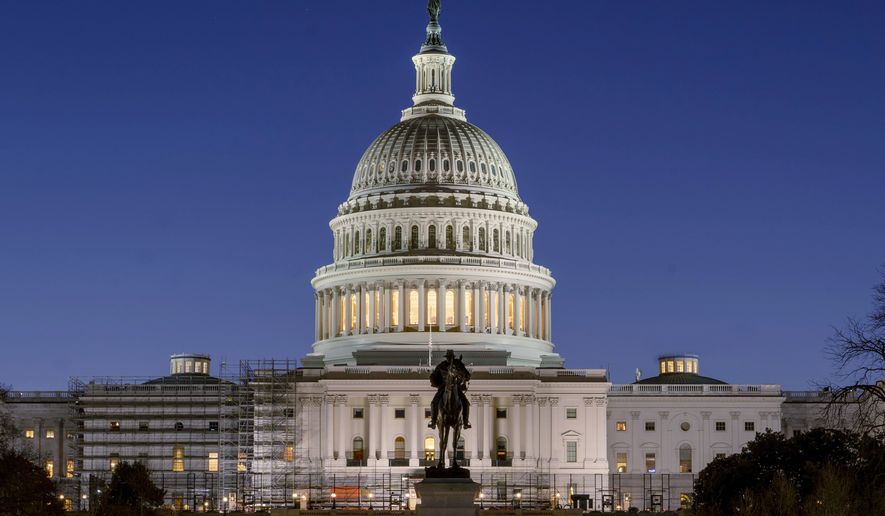OPINION:
Veteran Democratic political strategist James Carville crafted a timeless slogan when he coined the 1992 phrase “It’s the economy, stupid,” affirming the belief that money — or the lack thereof — is most likely to move voters to action.
After all, if people have empty coffers, less financial security and a diminished ability to buy basic needs, they’re much more likely to sour on whoever is in power.
But while Mr. Carville’s political sentiment remains valid 30 years later, the cultural evolutions underway are complicating this political mantra, turning Democrats’ tough political season into a potential monstrosity of a crisis.
Plainly stated: A bizarre mixture of social issues and intensifying financial crises is breeding an electoral implosion for progressives.
In the past, there was more nuance in the parties’ perspectives. Democrats’ position on abortion was “safe, legal and rare,” drag queen story hour would have forced even the most liberal person into a fit of pearl-clutching, and the biggest debates in public schools were over prayer and evolutionary teachings.
Flash-forward a few decades and notable proportions of liberals have jumped on the “shout your abortion” bandwagon, many progressives regularly support exposing kids to inappropriate content, and some routinely defend contentious topics’ presence in public schools.
“It’s the economy, stupid” was a fine explanatory mantra when the parties were closer together on the ethos of the day. But with the Democratic Party’s social stances becoming more extreme, these dynamics are quickly changing.
Today, voters aren’t only side-eyeing progressive leaders over dwindling bank accounts, maxed-out credit cards and exorbitant grocery bills. They’re also noticing the other peculiar social antics highlighted by many far-left politicos who seem disconnected and unfocused.
This is precisely why Democratic strategist Hilary Rosen warned during Sunday’s appearance on CNN’s “State of the Union” that her party is on the verge of losing big time in Tuesday’s midterm elections.
“I’m a loyal Democrat, but I am not happy. I just think we did not listen to voters in this election and I think we’re going to have a bad night,” Ms. Rosen said. “When voters tell you over and over and over again that they care mostly about the economy, listen to them! Stop talking about democracy being at stake! Democracy is at stake because people are fighting so much about what elections mean. Voters have told us what they wanted to hear. I don’t think Democrats have delivered this cycle.”
Issues of importance extend well beyond the “democracy” issue, as a recent Gallup poll found a fascinating ranking of the topics voters said were “extremely” or “very” important to their congressional vote this election cycle. The first issue on the list is the economy (85%) and the second was crime (71%).
But, despite citizens’ clear worries about these pressing issues, many Democratic politicians have been hyper-focused on other issues such as abortion after the Supreme Court overturned Roe v. Wade in June. Abortion is certainly a motivator for both sides of the aisle, but when pitting it against safety and financial security, it cannot save Democrats from stinging losses.
Sure, many Americans were opposed to the overturning of Roe, though we also know 71% of citizens favor restrictions on abortion. Yet prominent Democrats — including President Biden — often refuse to state any gestational limit at which they would cap the procedure.
Abortion is just part of the problem, though. Consider a recent poll asking Americans their views on candidates who support gender transitions for minors. The stunning data found that 73% of voters are unlikely to choose candidates who support puberty blockers, sex-change operations or hormones for trans-identified youth.
Meanwhile, this issue has become a mainstay for many Democratic politicians, with Mr. Biden repeatedly defending transitioning young people.
Yes, “it’s the economy, stupid,” but that’s only part of the puzzle to understanding why so many political observers are predicting a red wave. See, once a person feels the pressures of a downturned economy, he or she begins to look around to assess what else is awry.
Previously, voters would have seen Democrats taking more rational approaches to social issues and those issues would have had a less diabolical impact, but that ship has now sailed. Between strange social perspectives, COVID-19 shutdowns and the state of education in America — an issue consistently heralded by Democrats — the situation is bleak (just 28% of Americans having a “great deal” or “quite a lot” of confidence in public schools).
Democrats appear out of pace, out of runway, and seemingly out of touch with what most Americans care about. The economy is the biggest conundrum, but social issues could be the final facet leading to disastrous midterms for the Democratic Party.
• Billy Hallowell is a digital TV host and interviewer for Faithwire and CBN News and the co-host of CBN’s “Quick Start Podcast.” Hallowell is the author of four books, including “Playing with Fire: A Modern Investigation into Demons, Exorcism, and Ghosts,” and “The Armageddon Code: One Journalist’s Quest for End-Times Answers.” He was formerly the director of content and communications at Pure Flix and the former faith and culture editor at TheBlaze.




Please read our comment policy before commenting.